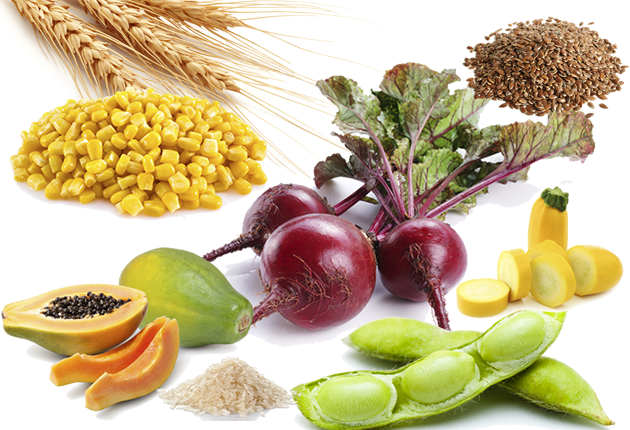Have You Heard?
With all the attention being given to pink this month with all of the ribbons, races and sneakers, we thought we should make you aware of another very important reason this month is so special. Happy Non-GMO Month!
You won’t see it in any of the headlines, no non-GMO sticker attached to football player helmets and sadly, there are no races or money being collected to further the research that GMO’s are killing us.
However, since 2010, October has been designated as Non-GMO month. What does this mean? It means that there are now 22,000 manufacturers that are concerned enough to pay a significant amount of money to have a NON-GMO sticker attached to their product label. You see, there is no law that requires GMO ingredients to be disclosed on products.
What are GMO’s?
GMOs, or "genetically modified organisms,” are plants or animals created through the gene splicing techniques of biotechnology (also called genetic engineering, or GE). This experimental technology merges DNA from different species, creating unstable combinations of plant, animal, bacterial and viral genes that cannot occur in nature or in traditional crossbreeding. Genetic engineering is completely different from traditional breeding and carries unique risks.
In traditional breeding it is possible to mate a pig with another pig to get a new variety, but is not possible to mate a pig with a potato or a mouse. Even when species that may seem to be closely related do succeed in breeding, the offspring are usually infertile; a horse, for example, can mate with a donkey, but the offspring (a mule) is sterile.
With genetic engineering, scientists can breach species barriers set up by nature. For example, they have spliced fish genes into tomatoes. The results are plants (or animals) with traits that would be virtually impossible to obtain with natural processes, such as crossbreeding or grafting.
What combinations have been tried?
It is now possible for plants to be engineered with genes taken from bacteria, viruses, insects, animals or even humans. Scientists have worked on some interesting combinations:
- Spider genes were inserted into goat DNA, in hopes that the goat milk would contain spider web protein for use in bulletproof vests.
- Cow genes turned pigskins into cowhides.
- Jellyfish genes lit up pigs' noses in the dark.
- Arctic fish genes gave tomatoes and strawberries tolerance to frost.
- Potatoes glowed in the dark when they needed watering.
- Human genes were inserted into corn to produce spermicide.
- Corn engineered with human genes (Dow)
- Sugarcane engineered with human genes (Hawaii Agriculture Research Center)
- Corn engineered with jellyfish genes (Stanford University)
- Tobacco engineered with lettuce genes (University of Hawaii)
- Rice engineered with human genes (Applied Phytologics)
- Corn engineered with hepatitis virus genes (Prodigene)
Alfalfa
Rice
Cotton
Zucchini
Corn
Sugar Beets
Papaya
Wheat
Flax
Canola
Soy
Yellow Squash
Ingredients from these crops may not be used in Non-GMO Verified products unless DNA testing shows them to be compliant with the Non-GMO Project Standard:
Ingredients derived from these risk crops include (but are not limited to):
Amino Acids, Aspartame, Ascorbic Acid, Sodium Ascorbate, Vitamin C, Citric Acid, Sodium Citrate, Ethanol, Flavorings ("natural" and "artificial''), High-Fructose Corn Syrup, Hydrolyzed Vegetable Protein, Lactic Acid, Maltodextrins, Molasses, Monosodium Glutamate, Sucrose, Textured Vegetable Protein (TVP), Xanthan Gum, Vitamins, Yeast Products.
The following animal products are also considered high-risk because of potential GMO contamination from feed.
Milk
Meat
Eggs
Honey & other Bee products
WHAT ARE THE HEALTH RISKS OF CONSUMING GMO FOODS?
Though it will take many years to fully appreciate the damage done to the human body when genetically modified foods are consumed there is already research that clearly points to the potential dangers.
Genetically modified potatoes damage rats – The rats developed potentially precancerous cell growth in the digestive tract, inhibited development of their brains, livers and testicles, partial atrophy of the liver, enlarged pancreases and intestines and immune system damage.
Rats fed GM tomatoes got bleeding stomachs, several died – 7 of 40 rats in the study died.
Sheep died after grazing cotton fields genetically modified cotton – 25% of the sheep died within one week.
Farmers report pigs and cows became sterile from GM corn -- More than 20 farmers in North America report that pigs fed GM corn varieties had low conception rates, false pregnancies or gave birth to bags of water. Also, both male and female pigs became sterile.
Most offspring of rats fed Roundup Ready soy died within three weeks
Rats fed Roundup Ready canola had heavier livers
GM peas generated an allergic-type inflammatory response in mice
The above are extracted from Jeffrey Smith’s book called, Genetic Roulette where he outlines 65 known health risks.
Since the lobbyists for biotechnology have deep pockets and many scientists have lost their jobs in an effort to get the word out that these industries are creating harmful products, it is likely that we have only seen the tip of the iceberg when it comes to the true harm this industry is causing humans, animals and our environment. Sadly, as has been said before, young children tend to bear the brunt of these “new-fangled ideas.” Their small bodies cannot handle these types of foods and it is alarming that our world is seeing larger numbers of childhood illnesses including cancer.
The famous and the fortunate are not racing to cure this one. In fact, we would not be surprised if this is the first time many of you have heard that October is Non-GMO month. But, if you want your children and grandchildren to have a fighting chance in this world, you may want to take a closer look at those vitamins you are popping into their mouths. The derivatives of these products are likely a genetically engineered ingredient.
Please educate yourself and get involved in this battle. It may not have any colored ribbons attached and it may not garner the support of any famous football star, but in the end, if you don’t want to unknowingly give medicine (yes, it can contain one or more of those genetically engineered ingredients!) or a vitamin to your child that is more harmful than beneficial, you must stay abreast of what is going on in the industry that has nearly complete control over almost everything that you drink and eat.
Stay informed and get involved. Read more on the websites below and begin today to support the real “heroes” that can make a much greater difference in the lives of our families.
A couple of great websites you should take a look at:
http://www.nongmoshoppingguide.com/
http://www.responsibletechnology.org/10-Reasons-to-Avoid-GMOs
http://www.responsibletechnology.org/gmo-dangers/65-health-risks






